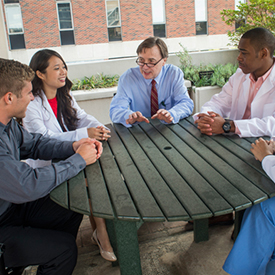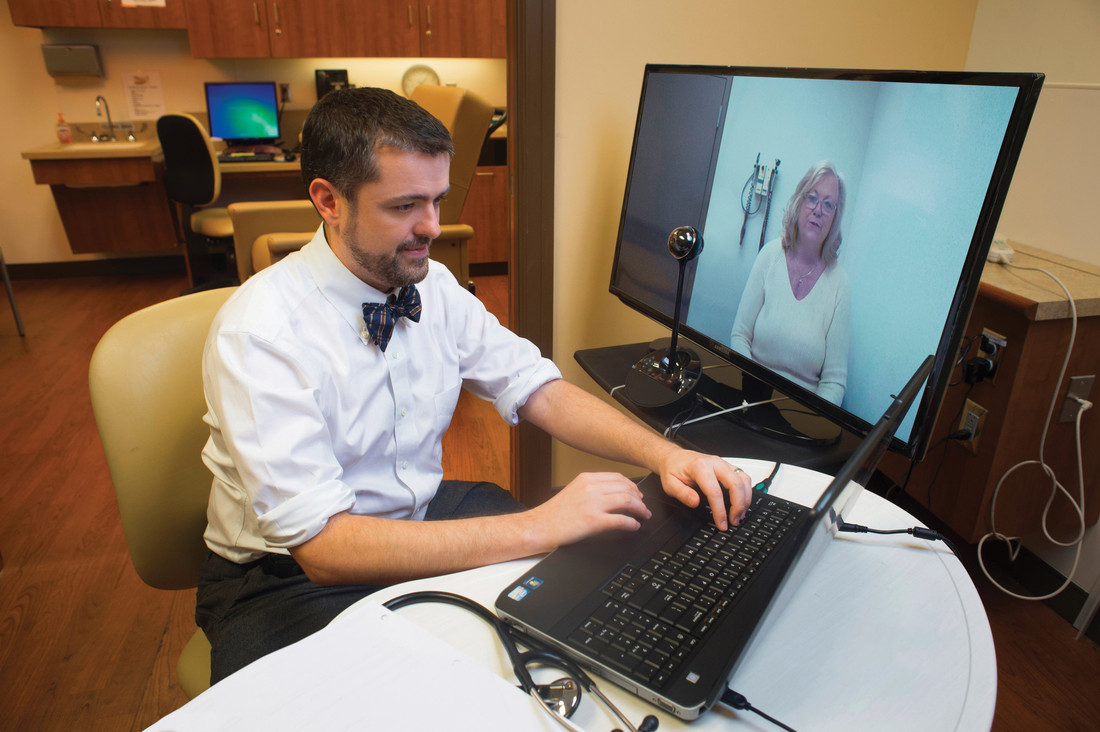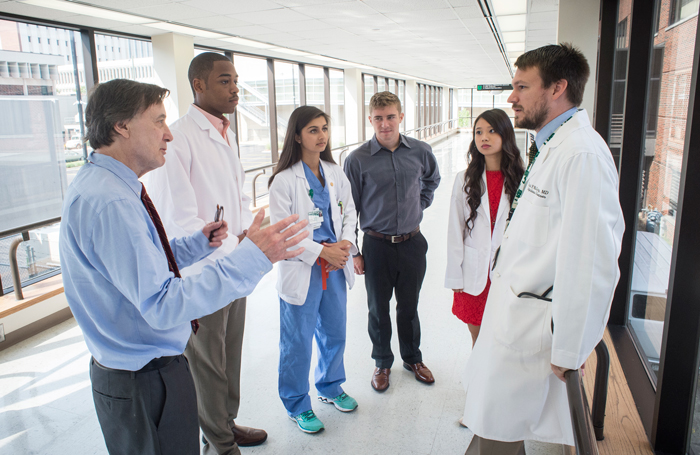 EMSAP Director Dr. Gregory Pence talks with Early Medical School Acceptance Program students.Nearly 30 years ago in 1988 UAB accepted its first student into its Early Medical Acceptance Program. That student, Edward Yeh, is now a 46-year-old physician working in emergency medicine in Columbia, South Carolina. Three decades later, about 300 high school seniors have entered what has become one of the nation’s most prestigious B.S./M.D. programs.
EMSAP Director Dr. Gregory Pence talks with Early Medical School Acceptance Program students.Nearly 30 years ago in 1988 UAB accepted its first student into its Early Medical Acceptance Program. That student, Edward Yeh, is now a 46-year-old physician working in emergency medicine in Columbia, South Carolina. Three decades later, about 300 high school seniors have entered what has become one of the nation’s most prestigious B.S./M.D. programs.
According to EMSAP Director Gregory Pence, Ph.D., the program had a rocky start. Pence taught bioethics in the medical school for 34 years. One day in 1992, a medical student approached him who attended UAB as an undergraduate in EMSAP. “What is EMSAP?” Pence asked. Although he had taught philosophy to undergraduates for 16 years, he had never heard of it.
Pence soon discovered that UAB admitted 10 students to the EMSAP every year, but they lacked any mentor. In fact, there was no ‘program’ for the ‘P’ in EMSAP,” says Pence. In 1994, Pence volunteered to mentor EMSAP students. At the end of the first year, the first group presented him with a gold pen. As years passed, Pence became more involved, and he now directs the EMSAP and chairs the Department of Philosophy in the College of Arts and Sciences, but no longer teaches in the medical school.
“The great breakthrough occurred in 1992, when admissions asked me to do a TED-type lecture for high-ability students considering UAB,” says Pence. In the audience was Neel Varshney, who joined the EMSAP and later became UAB’s first Rhodes Scholar. Varshney credited that lecture for persuading him to join the EMSAP. Jason Lott soon followed and won a Marshall Scholarship in 2001, as did Ameen Barghi, who won a Rhodes Scholarship in 2015. Along the way, the EMSAP also produced many Fulbright Scholars, Clinton Scholars, and USA Today Academic All-Americans.
Starting in 1996, Pence began to teach intensive, rigorous, required seminars for EMSAP students that focused on his two specialties: bioethics and narrative medicine. Along the way, the program began to require the MCAT and then a higher and higher MCAT score. Today, EMSAP seniors must score at least as well as those entering UAB’s School of Medicine.
“Some feared that if we required the MCAT, or a good score, we would lose applicants. What happened is, we did lose some applicants, but we gained more of the right kind. ‘If you build it, they will come,’” Pence says.
 Dr. Eric Wallace, former EMSAP student, UAB School of Medicine graduate, and medical director of telemedicine at UAB.EMSAP students enjoy a variety of opportunities to pursue interests and develop skills that can serve them well in medical school and beyond. "Being part of the EMSAP program allowed me to pursue fields of study seemingly not directly associated with medicine by decreasing the stress associated with medical school entry,” says Eric Wallace, M.D., FASN, a 2006 School of Medicine graduate who recently was named medical director of telemedicine at UAB. “I feel that this experience has directly influenced how I approach problems, taking inspiration from unlikely sources. Now, as the medical director of telemedicine, I am able to help our team apply new approaches to old problems.”
Dr. Eric Wallace, former EMSAP student, UAB School of Medicine graduate, and medical director of telemedicine at UAB.EMSAP students enjoy a variety of opportunities to pursue interests and develop skills that can serve them well in medical school and beyond. "Being part of the EMSAP program allowed me to pursue fields of study seemingly not directly associated with medicine by decreasing the stress associated with medical school entry,” says Eric Wallace, M.D., FASN, a 2006 School of Medicine graduate who recently was named medical director of telemedicine at UAB. “I feel that this experience has directly influenced how I approach problems, taking inspiration from unlikely sources. Now, as the medical director of telemedicine, I am able to help our team apply new approaches to old problems.”
"Dr. Pence and the EMSAP program provided me the opportunity during my undergraduate years to work with Dr. Patricia Goode at the Birmingham VA Medical Center," says Anand Iyer, M.D., a 2007 EMSAP graduate and a 2011 graduate of the School of Medicine, who is now a clinical instructor/fellow in the Division of Pulmonary, Allergy, and Critical Care Medicine. "She was an outstanding early research mentor who then brought in contact with other members of the UAB Division of Geriatrics, Gerontology, and Palliative Care during medical school, with whom I ultimately wrote my first, first-author manuscript. I learned basics of manuscript preparation, clinical research, biostatistics, and how to work collaboratively in a team. All of these skills I still use today over 10 years later in my clinical research in palliative care and life-space mobility in COPD. I am trying to build a program of inquiry of palliative care in chronic lung disease, specifically COPD, and that pivotal early work is helping me to bridge the gap between geriatrics/palliative care and pulmonary-critical care."
"EMSAP provided me with the support and mentorship that empowered me to develop my interests beyond what I thought others expected of me," says Rachael Rosales, M.D., who is currently a psychiatry resident at Harvard Medical School. "I'm so grateful that I was nurtured to pursue my own interests rather than check off a predetermined list of activities that would help me get into medical school. Instead, I pursued subjects that I found genuinely interesting, which have been much more important in fueling my professional development and curiosity."
Todd McCarty, M.D., a 2010 School of Medicine graduate who is now an assistant professor in the UAB Division of Infectious Diseases, agrees that the program's emphasis on pursuing interests outside of science and medicine is one of its most valuable qualities. "I think it helps promote a more well-rounded person, and for me personally, I think it has been part of what led me to become involved with our Office of Patient Experience as an associate experience officer," he says. "How we communicate and interact with patients is just as important as what we have to say. The humanistic side of medicine can sometimes take a back seat in medical school and training, so being able to get back to that has been a great thing for me and how my career has developed.”
In 2008, the program added dental and optometry students. Jessie Chu recently opened her own dental practice, and Elora Robbani and Kelsie Morgan started UAB’s Optometry School last year (with Kelsie elected class president).
 Dr. Pence (left) and EMSAP students talk with Dr. Todd McCarty (right), a former EMSAP student and current infectious diseases physician at UAB.About 100 combined-degree programs exist nationally, but UAB’s program is unique because most students qualify for scholarships. “At most other places, admission to the combined program motivates parents to pay for four years of tuition, but not so at UAB,” Pence says. Another difference is UAB’s EMSAP is one of the few programs that allows a student to apply to other medical schools and not lose his/her guaranteed place in professional school. For Pence, it is validating when Harvard or Johns Hopkins want EMSAP’s best graduates every year. So far, about 10 students have gone to Harvard or Hopkins, and about two dozen have done residencies there.
Dr. Pence (left) and EMSAP students talk with Dr. Todd McCarty (right), a former EMSAP student and current infectious diseases physician at UAB.About 100 combined-degree programs exist nationally, but UAB’s program is unique because most students qualify for scholarships. “At most other places, admission to the combined program motivates parents to pay for four years of tuition, but not so at UAB,” Pence says. Another difference is UAB’s EMSAP is one of the few programs that allows a student to apply to other medical schools and not lose his/her guaranteed place in professional school. For Pence, it is validating when Harvard or Johns Hopkins want EMSAP’s best graduates every year. So far, about 10 students have gone to Harvard or Hopkins, and about two dozen have done residencies there.
Some might consider it a failure if an EMSAP student does not become a medical professional, but not so for Pence. “It’s perfectly okay with me for a student to discover that she does not like medicine and would rather be a lawyer,” he says. “I want people to find joy, not enter a career to fulfill someone else’s expectations.” He says about 10 percent of the program’s students quit voluntarily.
Another 10 percent of students don’t maintain the required minimum GPA (3.7 overall and 3.6 in math/science), or don’t receive the minimum MCAT score (509 on the new MCAT). Having high standards is good, Pence says, because it keeps EMSAP students in the running to apply for scholarships to professional schools. About half of graduates get some form of scholarship, but only because they are in the top 10 percent of those applying to professional schools. For example, EDSAP student Alex Cruz just became the first UAB student accepted to Harvard Dental School.
EMSAP students are also the key to Pence’s success coaching UAB teams in the Intercollegiate Ethics Bowl, where UAB won the national championship in 2010, and the Bioethics Bowl, which UAB has won twice, in 2011 and 2015.
Overall, it has been a serendipitous match, both for Pence and his EMSAP students. “I am blessed to mentor some of the brightest, most hard-working students in the country,” he says. EMSAP students appreciate the mentoring of someone who taught in UAB’s medical school for 34 years and who is considered one of the founders of the modern field of bioethics.
Pence also loves to teach writing, having authored nearly 20 books and 75 op-ed essays. “Good writing is clear thinking, and must be continually practiced,” he says. Many EMSAP students have become better writers under his tutelage and several have published op-eds in publications such as The New York Times and the Washington Post.
On Aug. 27, according to Pence, “the Great Wheel turns again” and 17 new EMSAP freshmen will attend a mandatory one-day seminar on their summer reading, which this year highlights Mountain Beyond Mountains about idealistic physician Paul Farmer. Why are there 17 students and not 10? Pence says that EMSAP previously accepted 19-20 students to yield about a dozen EMSAP graduates. This year, word has gotten around about EMSAP, and 17 students were accepted. “Even the two who turned me down agonized until the last day about it,” Pence says. Where did they go instead? Pence says, “Both were local kids and both accepted generous offers from Harvard.”
Posted July 25, 2017